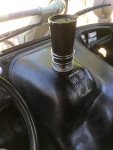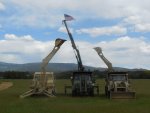rtrask
Well-known member
- 353
- 270
- 63
- Location
- San Luis Valley, Colorado
I finally got around to digging in and testing it a bit more, and did enough prep work so I can ask the question better and hopefully get better results.That is odd if I run a hot wire to the other pair of wires it activates the starter. I will have to take a closer look at it and repeat the experiment, maybe I got my wires crossed.
I took the 2 pages of wiring diagrams from the Student manual on the 24 VOLT STARTING SYSTEM S.E.E and color coded the wires to make it easy to follow the discussion. Please see diagram below.
View attachment 767569
The red line (211) goes to the started switch from the started non repeat relay, In the diagram, and confirmed by manually tracing the wire it is plugged in to the 87a plug on the relay, which should mean default on. The dark blue wire (215) is connected to the 30 plug on the relay and has 24 volts on it when the key is turned on, and I have the clutch starter lock out depressed. If I bypass the relay and run a wire directly from the dark blue line to the switch the starter engages.
If I remove (342) the light blue line and plug in the relay the starter engages through red line, and the volt meter confirms 24 volts on the light blue line, so I think that the relay is OK (it is brand new too). So the real question is why does light blue have 24 volts on it?
Based on what the 87 plug of the relay being connected to yellow (281) and that wire connecting to the KBI cold start switch & Ambient Temperature Sensor, was that one or both of these components was bad which is why I wanted to know where the ambient temperature sensor is. After thinking about it further, that was probably a red herring. There are problems in the cold start system, the KBI switch seems suspect, and solenoid at the ether injector is frozen. Also why will it not start with the cold start switch?
I must have the light blue and possibly the purple line wired incorrectly, or perhaps there is an issue with the reverse polarity switch, ... IDK any suggestions are welcome.



